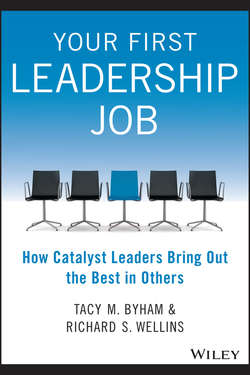Читать книгу Your First Leadership Job - Wellins Richard S. - Страница 4
На сайте Литреса книга снята с продажи.
Foreword
ОглавлениеLeadership makes a difference.
You might not know that now. But you will.
I've been in banking my entire career, primarily with Fifth Third Bancorp, which operates in a dozen states in the Midwest and Southeast. Banking is an interesting business for many reasons, but one of them is this: We don't make anything. Our product is exactly like our competitors'. We borrow it for the most part, and it all looks the same. It's green, rectangular, and has the same relative value on a given day. In order to stand out in a crowded field, the focus needs to be on how we deliver that value – 100 percent through our people.
I believe that leadership happens all around you. It happens in the tone you set and in the many, many conversations you have to accomplish one simple, but complex thing – bring people into the vision of the outcome you need.
But most people don't think about those things until they get their first leadership job. You're good at being an expert, and then you get promoted for your expertise into a completely different job. And so you experiment, because no one ever tells you – except for DDI – the right or wrong way to get the most commitment from the people around you.
Let me rewind the clock a bit. My first big leadership job was what my organization called a “broadening” responsibility – an assignment that addresses a challenge a company is having and that also helps a leader grow and develop. One day I was called in to see my boss's boss, the Vice Chairman, and I found myself being asked to take on a division in which I had no expertise. None. I was being asked to leave my job in human resources to run operations for the much larger holding company. And I would be leading folks who were highly technical, very proficient, and very experienced. I was in my mid-thirties, with three kids under 10 at home. My new reports were, in many cases, 20 years older. It was a challenging division in need of some significant change and facing big new performance goals.
I talked to some people who knew more about the challenges facing the operations division. I was worried, but I took the job. I knew going in that I didn't have a quarter of the knowledge of the people who had been there for years. And, I was going to need all of them to teach me.
That was the moment I knew I needed to rely on leadership.
We did a number of things, all of them focused on gaining people's trust. We began something new, what is now commonly called “one down” or “two downs.” We would regularly gather in large groups (some of the teams had 15 or 20 people), and I would encourage managers to talk about what they had accomplished. They could, in essence, brag to me. And then I would use those accomplishments to talk about what we could do if we all had the same vision. It sounds simple, but they were powerful moments. These conversations supplied the backbone for the kind of trust, vision-building, and engagement that, over time, helped everyone see how we could be recognized in the organization for the magnitude of the changes we were contemplating. I created a parade and gave them the opportunity to jump in front of it.
In the end, we accomplished one of the most significant changes in our company's history. We centralized operations, cut costs to the tune of 40 to 50 percent, improved service-level agreements and delivery, and boosted customer satisfaction.
So, now it's your turn. What will you do with the opportunity you've just been given?
I learned the concept of catalyst leadership from DDI early in my career, and this book will help you learn it too. You'll find out how catalysts can ignite a flame in others, gain their commitment, and drive productivity. Now, I've never met a perfect supervisor. I've never been one. Leadership takes work. But, the upside is tremendous – helping people achieve their goals and dreams.
We all approach leadership from different angles. But if you focus on the goal of catalyst leadership and put it in practice every day, then you'll bring out the best in others in surprising ways. You'll bring it about in yourself as well. And you'll love what you do.
Kevin T. Kabat
Vice Chairman and CEO at Fifth Third Bancorp
